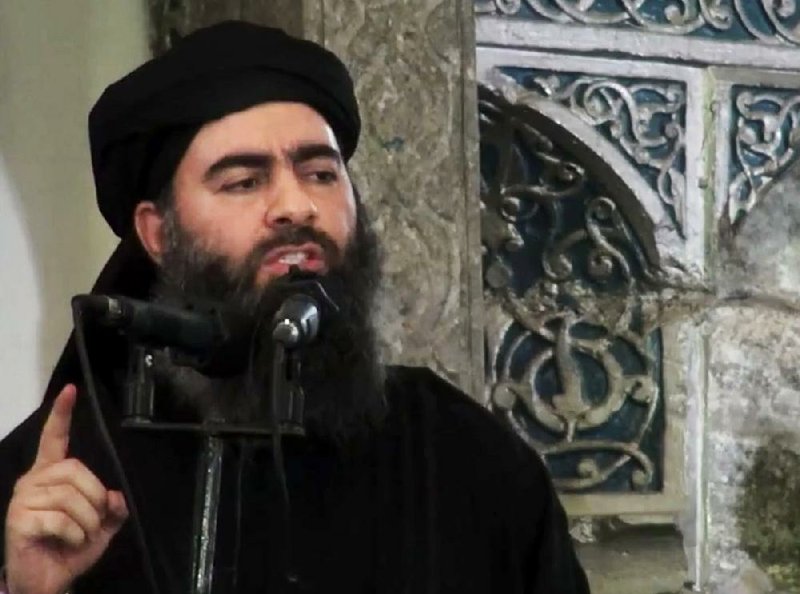BEIRUT -- The Islamic State militant group on Thursday released what appeared to be a rare recording of its cloistered leader, Abu Bakr al-Baghdadi, vowing to continue his group's fight in Iraq and Syria as its self-proclaimed caliphate there crumbles.
The recording, which has yet to be verified, included references to recent geopolitical developments, such as U.S. tensions with North Korea, in an apparent attempt to dismiss persistent reports that al-Baghdadi had been killed on the battlefield.
Russian officials said in June that there was a "high probability" that the Islamic State leader had died in an airstrike on Raqqa, the group's self-declared Syrian capital.
But U.S. officials have said as recently as August that they believed al-Baghdadi was alive. According to Western diplomats, the Islamic State's most senior officials are mostly believed to be around Mayadeen in eastern Syria, now a key military target for the U.S.-led coalition.
[THE ISLAMIC STATE: Timeline of group’s rise, fall; details on campaign to fight it]
Three years after seizing control of swaths of Syria and Iraq, Islamic State fighters have been reduced to defending a shrinking expanse from U.S. and Syrian-backed forces.
In Thursday's recording, the voice purporting to be al-Baghdadi's cast those defeats in a more generous light.
"This predicament is a generous gift from God," he said. He also sought to console his followers over their recent defeats, saying the top priority for Muslims is to "satisfy" God.
"Victory against their enemies and the enemy of God comes next," he said.
The date and whereabouts of the message's recording were unclear. Al-Baghdadi is notoriously secretive and rarely sighted. Media reports have suggested that he suffered a serious injury in the spring of 2015.
Save for the approximations that Islamic State leaders are hunkered down in eastern Syria, al-Baghdadi's whereabouts are unknown. The militant-held cities of Raqqa and Deir el-Zour are under siege, and officials believe they are too dangerous for him to hide in. But the group still holds a stretch of the Euphrates River from Deir el-Zour to the Iraqi border, as well as remote desert areas along the border.
The voice purporting to be al-Baghdadi's also urged followers to intensify attacks on the "headquarters" and "media centers" of perceived enemies. "America, Europe and Russia are living in a state of terror," he said.
He continued: "Never allow the crusaders and apostates enjoy a life of peace and security in their homes at the same time your brothers taste the bitterness of strikes and destruction."
He also lauded his fighters for what he called their valiant fight against U.S.-backed Iraqi forces that wrested control of Mosul, Iraq's second-largest city, from the Islamic State after nearly nine months of fighting.
"In Mosul, they defiantly stood firm on a land ruled by God's laws against the infidels and nations of the cross ... only leaving it over their skulls and dead bodies after nearly a year of fighting," he said. "The sons of Islam will willingly continue to sacrifice their blood and bodies for the sake of their creator."
The loss of Mosul was a symbolic blow to the Islamic State, which is also known as ISIS. It was after the group overran the city in June 2014 that the militants declared a caliphate stretching from northern Syria deep into the north and west of Iraq. And it was from Mosul's famed al-Nuri Mosque that al-Baghdadi made his only public appearance at a Friday sermon, declaring the caliphate and calling on Muslims the world over to follow him.
At the time, he vowed that the Islamic State would conquer "Rome," and the entire world.
Mosul was also the bureaucratic and financial hub of the Islamic State. Raiding Mosul's central bank, and taxing and extorting the city's wealthy inhabitants, made the Islamic State the world's richest terrorist organization. Mosul's vast industrial zones were converted into factories for weapons and explosives.
Taking back Mosul from the Islamic State came at enormous cost and destruction, especially in the western part of the city. Islamic State fighters had turned the city into a fortress, holding tens of thousands of civilians as human shields.
Al-Baghdadi, in the recording, also spoke of what he called the United States' waning global power, saying Russia was taking advantage of that to cast itself as the superpower replacing America. Russia, he added, was in full control of the "Syrian file."
Citing examples of America's perceived weakness, he referred to Russia's annexation of Crimea and "North Korea's nuclear threat against America and Japan."
At the peak of its power in 2014 -- when the Iraqi army crumbled amid the militants' blitz -- the Islamic State controlled about a third of both Syria and Iraq but has steadily lost ground in the face of a U.S.-led coalition that has backed Iraqi forces as well as Kurdish-led Syrian fighters battling the extremists across the border in Syria.
Forces loyal to Syrian President Bashar Assad, backed by Russia and Iran, have also driven the Islamic State out of significant territory.
Information for this article was contributed by Louisa Loveluck and El-Ghobashy of The Washington Post and by Hamza Hendawi of The Associated Press.
A Section on 09/29/2017
